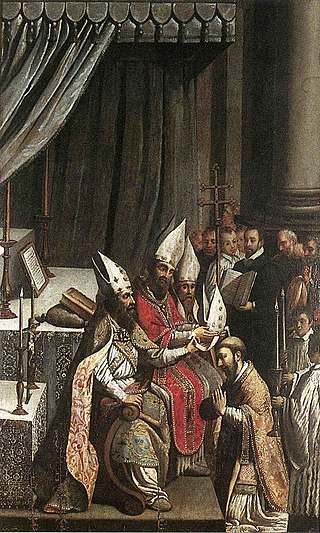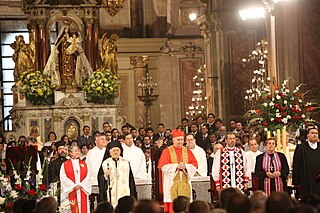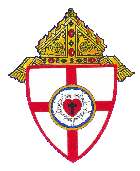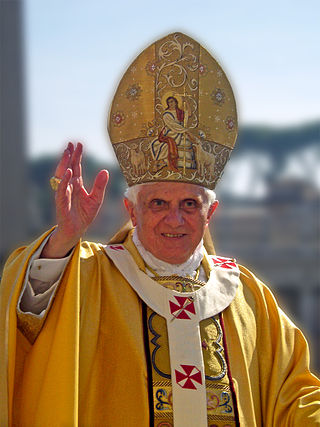See also
- Anglican–Roman Catholic International Commission
- Faith and Order Commission (World Council of Churches)
- International Theological Commission (Roman Catholic)
- World Evangelical Alliance Theological Commission
In 2010, the Faith and Order Commission of the General Synod of the Church of England was created out of the Faith and Order Advisory Group, which had been in existence since at least 1985. [1] In the process of transformation from an 'Advisory Group' to a 'Commission of the General Synod' the organisation took over responsibility for investigating questions regarding the doctrine of the Church of England previously discharged on an occasional basis by a Doctrine Commission of the General Synod. The new commission also absorbed the House of Bishops Theological Group. [2] As the successor to the Faith and Order Advisory Group the Commission maintains close links with the Council for Christian Unity.
The Faith and Order Commission comprises sixteen members (six bishops, one of whom is the Chair, and ten lay or ordained persons). The six bishops together comprise the House of Bishops Theological Group and are able to meet separately as required. The Commission meets four times per year.

Apostolic succession is the method whereby the ministry of the Christian Church is considered by some Christian denominations to be derived from the apostles by a continuous succession, which has usually been associated with a claim that the succession is through a series of bishops. Those of the Catholic, Eastern Orthodox, Anglican, Church of Sweden, Oriental Orthodox, Church of the East, Hussite, Moravian and Old Catholic traditions maintain that "a bishop cannot have regular or valid orders unless he has been consecrated in this apostolic succession". These traditions do not always consider the episcopal consecrations of all of the other traditions as valid.

The Church of England is the established Christian church in England. It traces its history to the Christian church recorded as existing in the Roman province of Britain by the 3rd century and to the 6th-century Gregorian mission to Kent led by Augustine of Canterbury. Its adherents are called Anglicans.
An ecumenical council, also called general council, is a meeting of bishops and other church authorities to consider and rule on questions of Christian doctrine, administration, discipline, and other matters in which those entitled to vote are convoked from the whole world (oikoumene) and which secures the approbation of the whole Church.

Ecumenism – also called interdenominationalism, or ecumenicalism – is the concept and principle that Christians who belong to different Christian denominations should work together to develop closer relationships among their churches and promote Christian unity. The adjective ecumenical is thus applied to any non-denominational initiative that encourages greater cooperation and union among Christian denominations and churches.

In ecclesiology, the Christian Church is what different Christian denominations conceive of as being the true body of Christians or the original institution established by Jesus. "Christian Church" has also been used in academia as a synonym for Christianity, despite the fact that it is composed of multiple churches or denominations, many of which hold a doctrinal claim of being the "one true church", to the exclusion of the others.
The Continuing Anglican movement, also known as the Anglican Continuum, encompasses a number of Christian churches, principally based in North America, that have an Anglican identity and tradition but are not part of the Anglican Communion.
The General Synod is the tricameral deliberative and legislative organ of the Church of England. The synod was instituted in 1970, replacing the Church Assembly, and is the culmination of a process of rediscovering self-government for the Church of England that had started in the 1850s.
The Anglican–Roman Catholic International Commission (ARCIC) is an organization created in 1969 which seeks to make ecumenical progress between the Anglican–Catholic dialogue. The sponsors are the Anglican Consultative Council and the Pontifical Council for Promoting Christian Unity.

In Anglicanism, a licensed lay minister (LLM) or lay reader is a person authorised by a bishop to lead certain services of worship, to preach and to carry out pastoral and teaching functions. They are formally trained and admitted to the office, but they remain part of the laity, not of the clergy.

Anglican eucharistic theology is diverse in practice, reflecting the comprehensiveness of Anglicanism. Its sources include prayer book rubrics, writings on sacramental theology by Anglican divines, and the regulations and orientations of ecclesiastical provinces. The principal source material is the Book of Common Prayer, specifically its eucharistic prayers and Article XXVIII of the Thirty-Nine Articles. Article XXVIII comprises the foundational Anglican doctrinal statement about the Eucharist, although its interpretation varies among churches of the Anglican Communion and in different traditions of churchmanship such as Anglo-Catholicism and Evangelical Anglicanism.

The Catholic Church has engaged in the modern ecumenical movement especially since the Second Vatican Council (1962-1965) and the issuing of the decree Unitatis redintegratio and the declaration Dignitatis humanae. It was at the Council that the Pontifical Council for Promoting Christian Unity was created. Those outside of the Catholic Church were categorised as heretics or schismatics, but in many contexts today, to avoid offence, the euphemism "separated brethren" is used.
Ecclesiastical polity is the operational and governance structure of a church or of a Christian denomination. It also denotes the ministerial structure of a church and the authority relationships between churches. Polity relates closely to ecclesiology, the study of doctrine and theology relating to church organization.
Anglican doctrine is the body of Christian teachings used to guide the religious and moral practices of Anglicans.
The historic or historical episcopate comprises all episcopates, that is, it is the collective body of all the bishops of a group who are in valid apostolic succession. This succession is transmitted from each bishop to their successors by the rite of Holy Orders. It is sometimes subject of episcopal genealogy.

The Augustana Catholic Church (ACC), formerly the Anglo-Lutheran Catholic Church (ALCC) and the Evangelical Community Church-Lutheran (ECCL), was an American church in the Lutheran Evangelical Catholic tradition.

Barry Rogerson was the first Bishop of Wolverhampton from 1979 to 1985 and, from then until his retirement in 2002, the Bishop of Bristol. He holds Honorary degrees from Bristol & the West of England Universities. He was made a Freeman of the City and County of Bristol in 2003.

Pope Benedict XVI, who led the Roman Catholic Church as Pope from 2005 to 2013, continued manouevring the Church through the dynamics of modernity, which the Church had begun engaging in with the Second Vatican Council. Because the question of religious pluralism is a key issue raised by modernity, ecumenism, the establishment of harmony and dialogue between the different Christian denominations, is a significant concern of a post Second Vatican Council Church. Pope Benedict XVI's approach has been characterised as leaning toward the conservative while still being expansive and engaged, involving the full breadth of Christendom, including the Orthodox Churches and Protestant churches, as well as freshly engaging with other Christian bodies considered by Roman Catholics to be more heterodox, such as the Church of Jesus Christ of Latter-day Saints.
Anglican–Roman Catholic dialogue is the historical communication between the Anglican Communion Protestant and the Catholic Church, through their ecumenical relations. These were notably shaped subsequent to the Second Vatican Council (1962–1965).
Paul David Loup Avis is an English Anglican priest, theologian, and ecumenist. He was General Secretary of the Church of England's Council for Christian Unity from 1998 to 2011, theological consultant to the Anglican Communion Office, London, from 2011 to 2012, and Canon Theologian of Exeter Cathedral from 2008 to 2013. He was honorary professor in the Department of Theology and Religion at Durham University 2017-2021 and is currently Honorary Professor in the School of Divinity, University of Edinburgh (2022-). At the University of Exeter he was visiting professor of theology from 2009 to 2017 and subsequently honorary research fellow until 2021. He is the editor of the series Anglican-Episcopal Theology and History, also published by Brill. Avis was also a chaplain to Queen Elizabeth II, 2008–2017.
During the twentieth century, the Church of England periodically established a doctrine commission to report on an important theological question. The first commission "was appointed in 1922 and reported in 1938". In early years the commissions appear to have been appointed solely by the Archbishops of Canterbury and York. In recent years the doctrine commission was constituted as a sub-commission of the General Synod. However, the members of the doctrine commission continued to be nominated by the Archbishops. In the early 1980s the House of Bishops took a greater interest in the work of the doctrine commission and the report We Believe in God (1987) was published "under its authority". This practice continued for the next three reports. After the completion of Being Human (2002) no further doctrine commission was nominated. In 2010 General Synod established a new permanent Faith and Order Commission of the General Synod which took over responsibility for producing theological reports for the House of Bishops.